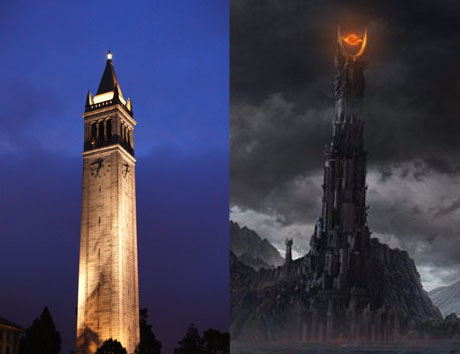“Don’t get thrown out of the ivory tower; you wanna be in there with Sauron.”
My friend likes to write down funny things that one of his professors says in seminars, and this particular quote made me laugh out loud. Why? Well, let’s start with “ivory tower”, which is more than just a particularly difficult level to beat in RollerCoaster Tycoon.
The phrase was arguably first used in the Song of Solomon 7:4, where the Beloved’s neck is compared to a tower made of ivory, or מִגְדָּל שֵׁן (migdal shen). It is said to represent noble purity, and it certainly has a positive connotation. I mean, just read the rest of the poem and try to visualize what this woman must look like…
Similar to other things that are pretty but impractical (think of white elephants), the ivory tower eventually, over centuries, came to symbolize something a bit more negative, or at least tongue-in-cheek. People who were described as living in ivory towers were considered secretive, mysterious, or wholly dedicated some whimsical pursuit far removed from everyday life. Today, it is most often used as a nickname for academia, the cordoned-off world of scientists and intellectuals who have trouble bridging the gap between their scholarship and the concerns of laypeople.
Now, about the humorous allusion to the Lord of the Rings character, Sauron: it is well known that he took on the iconic form of a giant flaming eye on top of a tower deep in the heart of Mordor (at least in the film adaptations). But of course, that tower wasn’t made of ivory. Barad-dûr, which in Elvish means “Dark Tower”, was probably made of iron, or maybe the crushed bones of Sauron’s enemies. Either way, it was quite the opposite of a pure, noble place.
(Another tower in Mordor, Carchost, is called the “Tooth Fort”, and it’s too bad — for my literary web-weaving, anyway — that Sauron never eyed this one for his sentinelship, because migdal shen could also mean “tower of teeth”. After all, what are some animals’ teeth made of?)
Sauron’s tower is not a place in which you want to be stuck. What about academia, though?
When I was applying to graduate school in the fall of 2013, I contacted my Hebrew professor from Swarthmore and asked for some career advice. She replied that she didn’t know much about graduate programs in linguistics, but something else she said has stuck with me ever since: “What I have more confidence about is that you are well cut out for academic life. I am so glad you are going to give the ivory tower a try.”
That says to me that academia is a challenge I had the choice to undertake. It’s certainly not a task on the level of destroying the One Ring, but it’s up there. And more importantly, it’s not something that has ever been required or expected of me. I don’t need my degree to meet my peers’ or parents’ expectations; I am just trying.
But sometimes it seems that even though I’m putting in a lot of effort, I am stuck. Some of my research projects have stalled, and I have so little to show for over a year of steady work. It’s like I’ve been climbing this big white obelisk, far enough up now that I can’t jump down again, but I’m not yet high enough to find a ledge and rest for a bit. And all the while Sauron’s fiery eye is staring and waiting for me to give up. Is this where I want to be?
I suppose that according to my friend’s professor, the answer is yes. To be stuck in the tower with Sauron is better than being thrown out. This is a strange analogy, but it’s not so different from the idea of keeping one’s enemies closer — the task is arduous, but all the more worthwhile if you try, try again, and eventually succeed.
So what made me laugh was not simply the absurd Middle Earth imagery or the sarcastic metaphorization of academia; a part of me also laughed in response to the challenge that I committed to last year. I can climb this tower, and I will.
ω
Word of the Day: thaumaturge [ˈθɑ.mə.tʰɘ˞dʒ], which comes from the Greek θαῦμα (thaûma, “miracle”) and ἔργον (érgon, “work”), refers to a person who performs miracles or magic. I happened across this word when I was looking up synonyms for necromancer (an epithet for Sauron in The Hobbit), but I’d say they are more like antonyms. Necromancy is dark magic, but thaumaturgy seems to have a more positive connotation: magic that brings healing and wonder. At least it’s a kind of magic that is not intimately associated with death.


I love the word thaumaturge! I’m trying to remember what books I’ve read it in. I used it in a very strange short story I wrote at Swarthmore (it got rejected from Small Craft Warnings my senior year). Also, I just Googled thaumaturge, and apparently some Christian saints were called thaumaturges!
When I look at what other people are doing with their lives, I do sometimes wonder what I’m doing in the weeds of linguistic theory when I could be working more directly for social justice…
LikeLike
I’ve only read one of Terry Pratchett’s books in the Discworld series, but apparently, he uses ‘thaumaturgy’ in place of magic to describe the supernatural. (It was “Small Gods”, by the way, and it left me very impressed.)
I like that turn of phrase: “weeds of linguistic theory”. 🙂
LikeLike